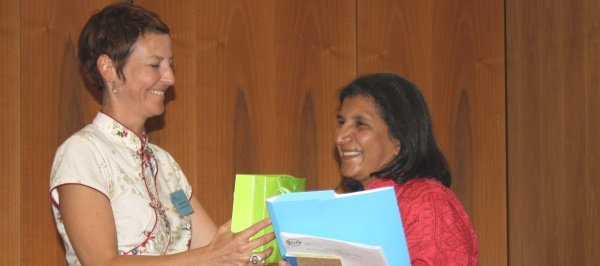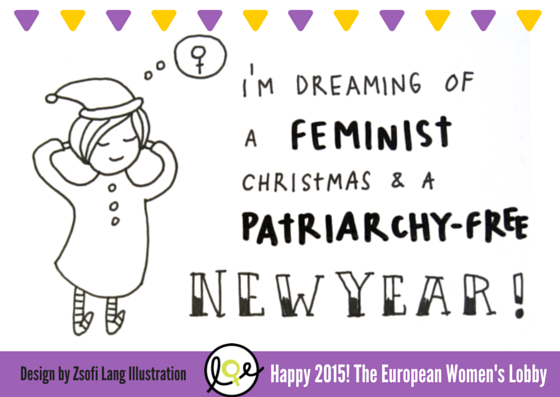[Brussels, 18 June 2011] This year’s EWL Annual Conference was dedicated to violence against women, the most widespread violation of human rights in Europe. On 18 June 2011, the UN Special Rapporteur on Violence against Women, EWL Members, experts to the EWL Observatory on VAW, EU policy-makers, activists, experts and NGO representatives gathered in Brussels to discuss the current political and sociological framework on violence against women (VAW) and the challenges NGOs and activists face in combating it.
The conference started with speeches by the United Nations (UN) Special Rapporteur on VAW and prof. Liz Kelly, a feminist researcher and activist from the UK, who has worked in the field of violence against women and children for 30 years.
Rashida Manjoo, the UN Special Rapporteur on Violence against Women, stipulated that VAW remains the most pervasive human rights violations in the world, irrespective whether there is peace, economic security, conflict or insecurity. Moreover, violence against women is often recognised as a human rights violation but not as a gender issue. As one of the major challenges to combat VAW, Rashida Manjoo pointed out the lack of implementation of existing legislation to tackle the root causes of violence. Along with that, more coherent policy and cooperation between the different levels of governance are needed, said Manjoo.
Professor Liz Kelly talked about new contexts and challenges we face, as sexualisation as a ‘conducive concept’ and symbolic violence, which undermine equality. She highlighted the neo-liberal trap and the consequences of austerity on the respect and promotion of women’s rights. She stressed the importance of not losing what we have gained over the years, including the understanding of the political dimension of violence against women, and the importance of independent /autonomous women’s organisations and women-only services, as feminist practice has been to restore the agency and control of women over their own bodies.
In the same line, during the second part of the conference, activists from different organisations addressed their questions to policy-makers from the EU. Picking up on the major concerns that Rashida Manjoo pointed out, the roundtable of activists questionned how the European institutions can become more involved and adequately allocate resources for projects to combat violence against women and girls. This has been recognised as the most urgent challenge that NGOs and activists are facing. Susana Pavlou, from the Mediterranean Institute of Gender Studies (MIGS) underlined that the priorities of the European Commission (EC) have been changing over the years, leaving fewer opportunities for funding of work on VAW. The worrying nature of this trend was seconded by Gabriella Heller (WAGGGS) and Nusha Yonkova (Immigrant Council of Ireland), who wondered whether EU policy makers are committed to combating violence against women with attention to specific vulnerable groups, such as young girls or migrant women.
The round table of activists gave also the EWL the opportunity to inform participants about the launch of its campaign ‘Together for a Europe free from prostitution’ and to screen its campaign clip, calling on men to stand up against the system of prostitution. Olga Trostiansky, from the French Coordination of the EWL (CLEF), presented the situation in France regarding prostituted persons and the legal framework, and expressed her delight to see a European campaign supporting the efforts at national level to end the system of prostitution. Her question to decision-makers focused on the EU’s role and action to foster education and prevention, and complemented the activists’ call for a clear EU action to give visibility to violence against women and end impunity.
To answer these questions, a round table of policy-makers followed the questions session. Ms Myria Vassiliadou, EU Anti-Trafficking Coordinator, pointed out that the EU recognises the need for a gendered approach as concerns trafficking in human beings; she stressed the importance of the implementation of the new EU directive, and its provisions obliging member states to provide services and minimum standards. She highlighted new forms of trafficking, which are also gendered in their nature and expression. According to her, EU institutions and NGOs need to collaborate in a more systematic manner. As an illustration she pointed out the recent initiative of the European Commission to bring together information about different initiatives on anti-trafficking, project funding and information about NGOs working in the field.
Additionally, Mr Aurel Ciobanu-Dordea, Director of Directorate D – Equality, DG Justice and responsible for VAW within the European Commission, announced that the European Commission has changed its opinion and will not plan an EU Strategy on Violence against Women, but, in place, wants to promote mainstreaming in all EC instruments, recognising the needs to fund women’s rights actions. He said that the lack of EU action on the issue is due to a lack of a favourable armosphere for extending EU competence at the moment. He referred to the EWL policy paper on the new multi-annual financial framework for the EU, stating that gender mainstreaming needs to be backed with adequate funding opportunities. Beata Hlawacz, a representative from the Permanent Representation of Republic of Poland to the European Union in Brussels, reassured the audience that the Polish Presidency has set it as a priority to concentrate on crime victims and will help the EC to publish its roadmap on the victims’ package.
With the input of experts and activists from different perspectives and countries, the EWL conference stimulated an insightful discussion on the challenges to combat violence against women. The conference was also a step forward for NGOs and EU institutions in working together for a Europe free from violence against women.
The conference was also the opportunity to launch the inaugural edition of its EWL e-magazine, the European Women’s Voice. The first issue of this thematic publication is dedicated to Violence against Women.



